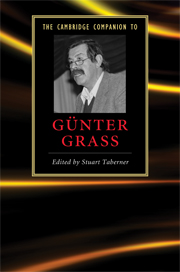Book contents
- Frontmatter
- Introduction
- 1 Biography as politics
- 2 Günter Grass’s political rhetoric
- 3 The exploratory fictions of Günter Grass
- 4 Günter Grass and magical realism
- 5 Günter Grass’s ‘Danzig Quintet’
- 6 Günter Grass and gender
- 7 Authorial construction in From the Diary of a Snail and The Meeting at Telgte
- 8 Günter Grass’s apocalyptic visions
- 9 Günter Grass and German unification
- 10 Günter Grass’s Peeling the Onion
- 11 Günter Grass as poet
- 12 Günter Grass and art
- 13 Günter Grass as dramatist
- 14 Film adaptations of Günter Grass’s prose work
- 15 Günter Grass and his contemporaries in East and West
- Guide to further reading
- Index
11 - Günter Grass as poet
Published online by Cambridge University Press: 28 January 2010
- Frontmatter
- Introduction
- 1 Biography as politics
- 2 Günter Grass’s political rhetoric
- 3 The exploratory fictions of Günter Grass
- 4 Günter Grass and magical realism
- 5 Günter Grass’s ‘Danzig Quintet’
- 6 Günter Grass and gender
- 7 Authorial construction in From the Diary of a Snail and The Meeting at Telgte
- 8 Günter Grass’s apocalyptic visions
- 9 Günter Grass and German unification
- 10 Günter Grass’s Peeling the Onion
- 11 Günter Grass as poet
- 12 Günter Grass and art
- 13 Günter Grass as dramatist
- 14 Film adaptations of Günter Grass’s prose work
- 15 Günter Grass and his contemporaries in East and West
- Guide to further reading
- Index
Summary
Grass's first book was a collection of poems, with graphics of his own. Poetry first brought him to the attention of the Group 47, the loose gathering of West German writers which emerged in the immediate postwar period, many of whom later became famous for their political engagement; and his poems were explicitly cited in his commendation for the Büchner Prize in 1965. Throughout his career, he has always returned to this first literary medium, very often in conjunction with his skills as draughtsman, etcher and water-colourist, for which he trained at art school. Collections of poems and limited editions have continued to appear throughout his career, right up to the 650-page volume of Sämtliche Gedichte (Collected Poems) published in 2007. Over the years, he has come back to the subject of poetry repeatedly in essays and interviews: 'Everything I have written up until now is the result of lyric impulses, sometimes extended over 700 sides.' Along with his graphic work, poetry is undoubtedly a kind of seedbed for ideas, which will sometimes emerge in other genres years, even decades, later. Indeed, a key topos of critical engagement with Grass's poetry is that his lyric work offers early, abbreviated versions of his prose or dramatic work. Grass has supported this line of interpretation and given a number of examples: pointing to his early poems 'Flag of Poland' (SP, p. 5) and 'The Scarecrows' (SP, pp. 27-9) as condensed versions of The Tin Drum and Dog Years respectively.
- Type
- Chapter
- Information
- The Cambridge Companion to Günter Grass , pp. 151 - 165Publisher: Cambridge University PressPrint publication year: 2009
- 1
- Cited by



